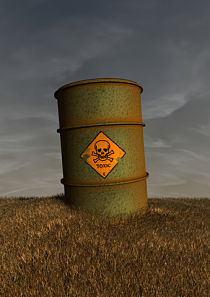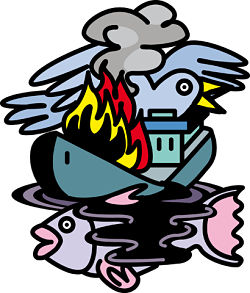Cancer Panel Critics Portray Ignorance as Bliss
The President’s Cancer Panel, in the April 2010 report Reducing Environmental Cancer Risk, implores the nation’s scientists and policymakers to decisively address the potential harm from over 80,000 manmade chemicals. This call-to-action is dense with

There is no "away." All toxins end up on our planet, polluting air, water, soil, plants, animals, and us.
stunning facts and a willingness to question accepted wisdom. The document is clearly written, immensely readable, and more suspenseful than a mystery or spy thriller.
The Panel directly takes on some of the wealthiest and most powerful lobbies in the US. The chemical, agricultural, pharmaceutical, medical care, and medical research industries all face intense and direct scrutiny. The Panel also highlights the weakness of government “regulatory” agencies, which often do little more than rubber stamp industry requests at the public’s expense. The Panel even takes the military to task for its unchecked role in spreading carcinogens.
Yet the report is not sensational or strident in tone. It doesn’t have to be. The facts speak for themselves, and any extraneous commentary or criticism would only weaken the conclusions. Reducing Environmental Cancer Risk is meticulously researched, with 454 direct references and input from 45 experts from academia, government, industry, and advocacy groups who testified at Panel meetings.
You might think that it’s just common sense that toxic manmade chemicals may cause cancer and other serious health problems. You might believe that major scientific organizations would welcome investigation into this critical and poorly understood topic.
You would be wrong. Critics from the New York Times to the American Cancer Society have bashed the Panel’s report. The American Cancer Society charges that report is based on opinion rather than fact and dismisses other known cancer causes, such as tobacco, obesity, infections, alcohol, hormones, and sunlight.
This assault on the report is itself misleading and inaccurate. Nowhere does the Panel state that such well-accepted factors are unimportant. Instead, the report explicitly states “At this time, we do not know how much environmental exposures influence cancer risk and related immune and endocrine dysfunction.”
Why is the American Cancer Society downplaying the importance of toxic substances? Their motivation is unclear, and hopefully is innocent. Regardless of the reason, this manufactured “controversy” diverts attention from the Panel’s urgent conclusions, confusing the public and creating a climate of complacency. Such statements are eerily reminiscent of industry’s baseless attempts to discredit Rachel Carson’s Silent Spring following its 1962 publication.
The credentials of the two members of the President’s Cancer Panel, responsible for the report’s conclusions, indicate the trustworthiness of the evidence. LaSalle D. Laffall, MD, earned a summa cum laude Bachelor of Science degree at age 18, and his
career has been uphill from there. He has authored or coauthored more than 140 publications, and was the first African-American President of the American Cancer Society – the organization now attacking his recommendations. He is currently a professor of surgery at Howard University. Margaret Kripke, Ph.D., is a professor of immunology emeriti at University of Texas M.D. Anderson Cancer Center. She has authored more than 250 scientific publications and received numerous awards, including Lifetime Achievement Awards from the American Society for Photobiology and the American Skin Association, among numerous others.
The achievements, public service, and professional recognition for these two top scientists could go on for pages. How likely are such brilliant and esteemed researchers to be to push an agenda with no factual basis? These leaders have no financial or other interest in anything but impartiality. Why would they cap their stellar careers with a questionable attack on environmental contaminants? Clearly there is overwhelming evidence that these substances need intensive and immediate study.
The only real flaw in this report is that it does not go all the way to recommending a plant-based diet as an important strategy to minimize intake of toxic chemicals. The authors may have felt they antagonized enough industries for one study without taking on the meat and dairy industries as well.
However, the recommendations for individuals acknowledge that animals raised for food are major sources of exposure to antibiotics, growth hormones, and toxic run-off. The report cautions against eating processed, charred, and well-done meats because of the carcinogenic chemicals formed during cooking. There goes the barbeque.
Here are a few highlights of report facts, findings, and recommendations.
• Children are far more vulnerable to environmental toxins and radiation than adults are
• 4 out of every 10 Americans will be diagnosed with cancer during their lives, and 2 out of 10 will die from this disease
• Since cancer takes many years to develop, short-term safety studies are not conclusive
• Women often have higher amounts of toxic chemicals in their bodies than men do
• Toxic chemicals and drugs can damage genetic material, putting future generations at risk
• Both the active and “inert” chemicals in pesticides and herbicides can threaten health
• Americans now receive almost half their total radiation exposure from medical imaging and other medical sources; in fact, patients receiving multiple scans may accumulate doses equal to or exceeding that of Hiroshima atomic bomb survivors
• Animal studies do not predict how humans will be affected by a chemical
The report is jammed with thought-provoking observations that make excellent quotes.
“Research on environmental causes of cancer has been limited by low priority and inadequate funding. As a result, the cadre of environmental oncologists is relatively small, and both the consequences of cumulative lifetime exposure to known carcinogens and the interaction of specific environmental contaminants remain largely unstudied.”

The mega-industries and government agencies are telling you everything is ok, don't worry. Do you believe them?
“The prevailing regulatory approach in the United States is reactionary rather than precautionary. That is, instead of taking preventive action when uncertainty exists about the potential harm a chemical or other environmental contaminant may cause, a hazard must be incontrovertibly demonstrated before action to ameliorate it is initiated. Moreover, instead of requiring industry…to prove their safety, the public bears the burden of proving that a given environmental exposure is harmful.”
“Numerous environmental contaminants can cross the placental barrier; to a disturbing extent, babies are born “pre-polluted.””
“Industry has exploited regulatory weaknesses.”
If you are intrigued by these facts and conclusions, download Reducing Environmental Cancer Risk for free and be prepared to stay up late. It’s hard to put down this page turner.
Judge for yourself whether this call-to-action is credible. Are you going to believe these esteemed researchers, or would you rather rely on mega-industries and government bureaucracies? How much of a chance are you willing to take for your own future, and your children’s? Either way you decide, now is the time to make your voice heard. Delay and complacency are not your friends.
Intrigued? Now you can use our Whole Foods Blog Finder to target informative, fun postings on plant-based nutrition. Quick information at no cost!
Blog by Janice Stanger, Ph.D. Janice authored The Perfect Formula Diet, a nutrition book built on sustainable food choices. Enjoy six kinds of whole foods for permanent, hunger-free weight loss and health.
Tags: American Cancer Society, cancer, Dr. LaSalle Leffall, Dr. Margaret Kripke, environmental contaminants, environmental degradation, getting healthy, Janice Stanger, making a difference now, Plant-based nutrition, President's Cancer Panel





